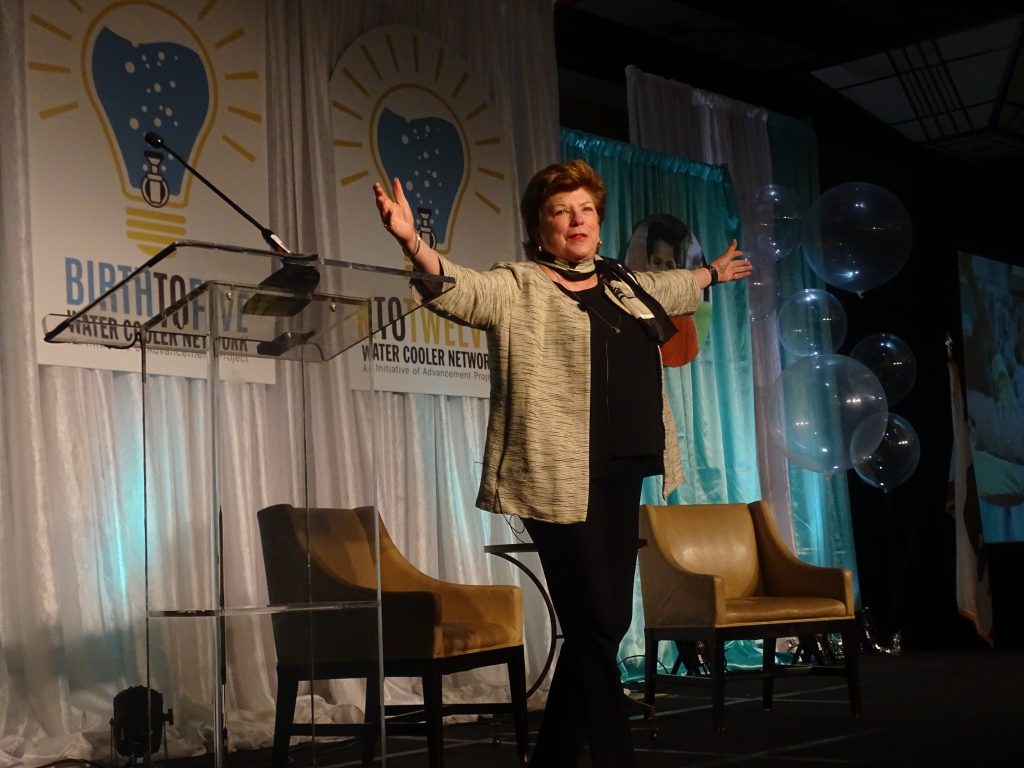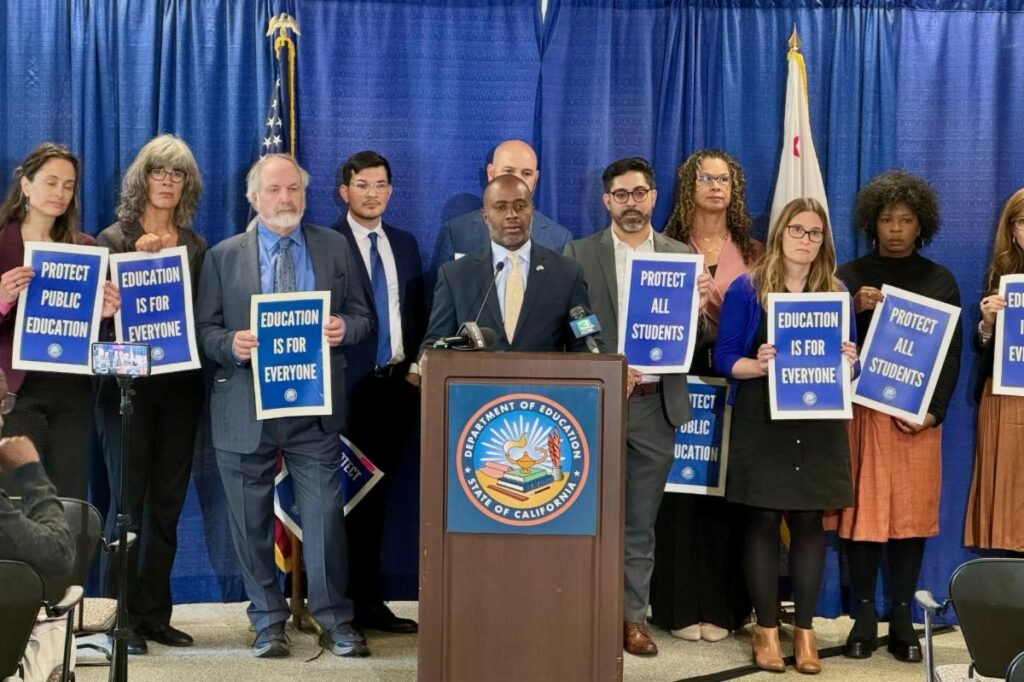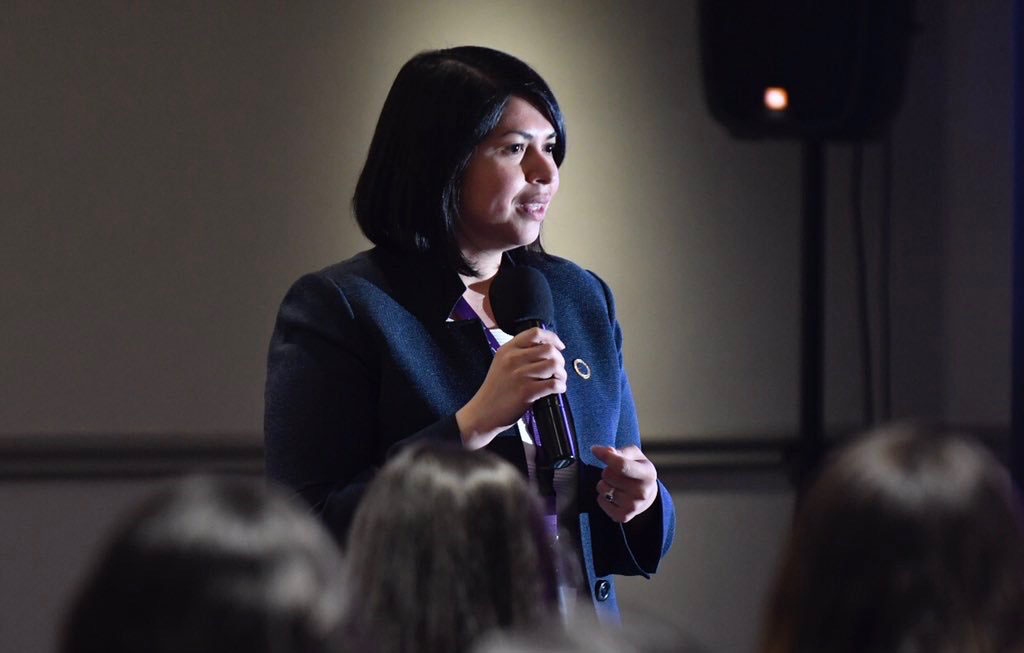
Daisy Gonzales, the executive director of the California Student Aid Commission, speaking at Hancock College in 2019.
Credit: California Community Colleges
When Dr. Daisy Gonzales took over as executive director of the California Student Aid Commission in June, she stepped into the position at a tumultuous time on the financial aid front, marked by state budget deficits, outside schemes to defraud financial programs and concerns over what President-elect Donald Trump will mean for undocumented students.
Among her first priorities: making sure more students apply for financial aid this year following declines in 2024 amid the chaotic and oft-delayed rollout of the federal government’s revamped Free Application for Federal Student Aid (FAFSA). The U.S. Department of Education last month made the 2025-26 version available. Most students in California use that form to access both state and federal aid for college costs. FAFSA completions in the state declined by an estimated 10% among incoming freshmen in 2024, mirroring a national decline, as students and families found it difficult to access and complete the form in a timely manner.
The state student aid commission (pronounced See-Sack by insiders) oversees more than $3.5 billion in state grants available to college students mainly based on need. That includes the Cal Grant, the state’s main financial aid awards that come in various types for tuition, living allowances and career or technical programs. The commission also oversees the Middle Class Scholarship, which can provide substantial grants to underwrite attendance at California’s public colleges and universities for students from families earning up to $217,000 a year.
In addition, the commission runs the California Dream Act Application for undocumented students, who can use it to apply for Cal Grants despite not being eligible for federal aid. Some students, including those who have citizenship or legal residency but an undocumented parent, may still be fearful to fill out any financial aid applications out of concern that information will be shared with the federal government. President-elect Donald Trump has vowed to deport undocumented residents when he takes office next year. State officials promise that Dream Act information will not be shared.
Meanwhile, community colleges in California and across the country continue to be plagued by financial aid fraud. Scammers, posing as students, enroll at the colleges for the sole purpose of stealing financial aid. California’s community colleges have lost more than $7.5 million this year alone to such fraud.
Dr. Gonzales was deputy chancellor of California’s community college system before joining the aid commission in July. She also served as the system’s acting and then interim chancellor. She was selected to her current post by the 15 members of the commission, 11 of whom are appointed by the governor and another four by the Legislature.
Previously, she was a consultant for the Budget and Appropriations Committees in the state Assembly. She has a bachelor’s degree from Mills College and received both a master’s degree and a doctorate in sociology from UC Santa Barbara.
She recently spoke with EdSource. The following conversation has been edited for clarity and brevity.
What is the Student Aid Commission doing to ensure students are completing the FAFSA this year?
We’ve been working differently with Cal Volunteers and training all of their volunteers to learn about financial aid, because they’re the boots on the ground. And even working differently with our segments. I’ve been really grateful to the community colleges. I gave them the data of those districts and colleges where we are leaving students behind, and they immediately got to work doing professional development, deploying messaging. (Cal Volunteers is a state office charged with increasing volunteering. Its College Corps program provides stipends for college students who volunteer.)
It was also important that I could hear directly from students. So I’ve also launched a student council where all the student associations (at local community college districts) have appointments on that council, and then they are activating their associations to educate students about financial aid, the deadlines, and even solutions to some of the common barriers that they face.
President-elect Donald Trump has vowed to deport undocumented residents. What guidance are you giving to undocumented students or students who have undocumented parents and are worried they could expose them by filling out the FAFSA?
We believe in providing students and their families with the information that will allow them to consider all of their options. We know that there are many concerns around privacy protections for individuals without a Social Security number.
Last year, the commission opened the Dream Act application to students from mixed-status families (those with both documented and undocumented individuals), and we are maintaining that. And so for any student, particularly if you’re a first-time applicant, if you have a family member, a parent, or a spouse that is a part of your application that does not have a Social Security number, you are being invited to complete the Dream Act application. We also have to inform you that as a part of not completing a FAFSA, you will not be able to benefit from federal aid. And our job is to help you understand that it’s your choice. And that applying is a family decision. Here at the commission, we protect your data. However, there are no similar federal reassurances that we can provide.
Are you doing any messaging to make sure students know that any information they submit via the California Dream Act Application is not shared with the federal government?
We redid our website so that we could have a very clear message around our data security. You can also then click on that message and it’ll show you additional information that’s important as you’re making your decision on whether to file a California Dream Act Application or FAFSA. We’ve also been deploying messages. For the first time, at least in the last several years, we actually sent out a notice that went to all education leaders — meaning the K-12 superintendents, the higher education presidents and CEOs. They all got the same message. And it was a message saying that our job is clear. We need students to stay enrolled. We need to offer them a safe option. And that is the California Dream Act Application.
There has been a big push by lawmakers in recent years to reform the Cal Grant by simplifying it and making more students eligible for aid, especially low-income community college students. That reform hasn’t happened because of state budget constraints. Is it still a priority of yours?
I’m here with a very clear mission to transform financial aid. I believe that it’s something that we can do together. And in doing so, then that means we are building financial aid pathways that are centered in student success. Yes, we need Cal Grant equity to be a reality, but that’s not yet funded.
But there are still so many other things that we can be doing. So, for example, I envision a California financial aid system that’s actually predictable. What would it look like to have an expedited renewal process for aid? I hear that as the No. 1 burden for students and families.
Another example I can give you is foster youth. They end up having to fill out two to five different applications. So at the commission, they might do three applications, if they qualify for those programs. And then when they get to a college, they still have to fill out an application for institutional aid. And so I challenged the team here at the commission, and I said, “What would it look like to create one application where we can ask students about all of the additional special programs that California has?” We need to be able to do this differently.
Even though Cal Grant reform was not funded in the latest state budget deal, there have been other ideas floating around about how to come up with that funding. One suggestion was to create a new tax that would raise dollars for financial aid. Are there other creative ways to possibly raise new funding?
There are many other states that do have additional taxes, particularly on alcoholic beverages. There are also so many different ways that I think we can move the needle here in California. I think we can do a better job in general communicating with students about what exists, how do they access it, and how we can actually help them achieve their end goal much faster. There are many other things that we can and should be doing.
What are your expectations for the 2025-26 state budget? Are you worried there could be further cuts to financial aid?
Nothing can be taken for granted, especially in a difficult year. We have a number of new legislators. So for me, it’s about reeducating, reaching out, building that relationship, especially with new elected officials. We’ve had to cut funding for the commission already by 7.95%. All state agencies received the same reduction. There was also a hiring freeze here at the commission. And all of this happened before I arrived. I don’t take anything for granted. I know it’s a really difficult year, but I also know that poverty has been increasing in the state. And so when I go out and advocate, I’m advocating for our students, and I’m defending the dollars that we have while helping California build pathways for many more Californians.
On another topic, California’s community colleges have lost millions of financial aid dollars this year and in recent years to fraudsters. Is there anything the student aid commission can do or is doing to alleviate the fraud? Or does that responsibility fall to the colleges?
I think the challenging thing about fraud is it keeps getting more sophisticated. Our campuses play a really critical role in identifying that fraud. And they are best positioned. But the commission can be a part of the alert system and a part of the professional development process. I’ve also asked for additional IT positions through the state budget process to be able to deal with some of these situations.






